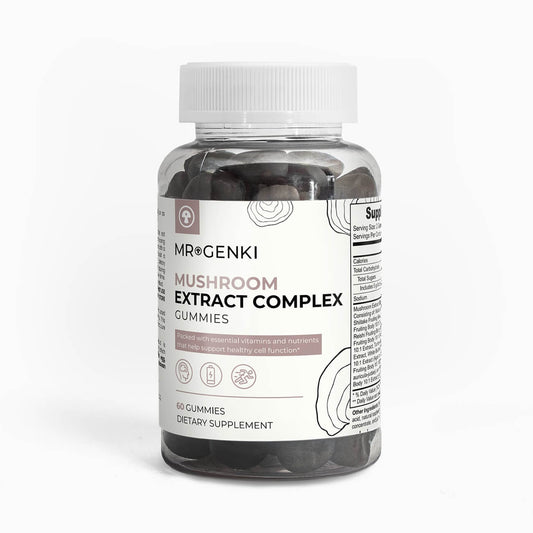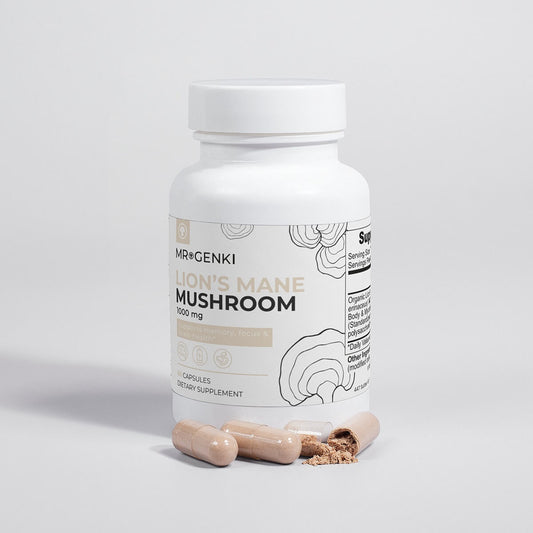In the fast-paced world we live in, maintaining focus and attention can be a daily struggle, especially for those with Attention Deficit Hyperactivity Disorder (ADHD).
But what if there was a natural way to support ADHD management?
Enter Lion's Mane mushroom, a powerful fungi that has been gaining attention for its potential cognitive benefits.
Lion's Mane mushroom, scientifically known as Hericium erinaceus, has a long history of use in traditional medicine, particularly in Asia.
Recent studies have shown that Lion's Mane contains compounds that may have neuroprotective and cognitive-enhancing properties.
It is believed to work by promoting the production of nerve growth factors, which play a crucial role in brain health and function.
One of the key challenges faced by individuals with ADHD is maintaining concentration and mental clarity. Lion's Mane mushroom may help to address these issues by supporting cognitive function, improving focus, and promoting mental clarity.
This natural remedy's potential to support ADHD management has piqued the interest of both researchers and individuals seeking alternative options for treatment.
In this article, we will explore the science behind Lion's Mane mushroom and its potential benefits for ADHD management.
From its history and traditional use to the latest research findings, we will delve into the promising role this natural supplement could play in unlocking focus for those with ADHD.
Key Takeaways Table
| Key Point | Details |
|---|---|
| Lion's Mane Mushroom and ADHD | Lion's Mane (Hericium erinaceus) shows potential in supporting ADHD management by enhancing focus and cognitive function. |
| Traditional Use | Used in traditional Chinese and Japanese medicine for digestive health, immune support, and vitality. |
| Bioactive Compounds | Contains hericenones and erinacines, which promote nerve growth factors crucial for neuron health. |
| Cognitive Benefits | May improve memory, attention, and overall cognitive performance by promoting neurogenesis. |
| Mental Clarity and Focus | Helps maintain concentration and mental clarity, beneficial for those with ADHD. |
| Anti-inflammatory and Antioxidant Properties | Reduces inflammation and oxidative stress in the brain, potentially alleviating ADHD symptoms. |
| Scientific Research | Studies suggest improvements in cognitive function, though more research is needed specifically for ADHD. |
| Recommended Dosage | Typically 500-1500 mg per day, divided into two or three doses; consult with a healthcare professional. |
| Supplement Selection | Choose high-quality, third-party tested supplements free from fillers and additives. |
| Comprehensive ADHD Management | Should be part of a broader ADHD management plan, including lifestyle modifications and other remedies. |
Understanding Lion's Mane Mushroom
Lion's Mane mushroom, scientifically known as Hericium erinaceus, is a unique fungi that resembles a lion's mane, hence its name. It has a long history of use in traditional Chinese and Japanese medicine, where it is valued for its potential health benefits.
Traditionally, it has been used to support digestive health, boost the immune system, and improve overall vitality.
The mushroom itself has a distinctive appearance, with long white tendrils that resemble a cascading mane. It can be found growing on hardwood trees, particularly in North America, Europe, and Asia.
In recent years, Lion's Mane has gained popularity in the Western world for its potential cognitive-enhancing properties and its ability to support brain health.
Lion's Mane contains bioactive compounds called hericenones and erinacines, which have been shown to have neuroprotective effects.
These compounds are believed to stimulate the production of nerve growth factors in the brain, which are essential for the growth and maintenance of neurons.
By promoting the growth of new neurons and protecting existing ones, Lion's Mane may have a positive impact on cognitive function and brain health.

The potential benefits of Lion's Mane Mushroom for ADHD management
Individuals with ADHD often struggle with maintaining focus, attention, and mental clarity. Traditional treatment options for ADHD typically involve the use of stimulant medications, such as Ritalin or Adderall, which can come with unwanted side effects.
This has led many individuals with ADHD to seek alternative solutions, such as natural remedies and complementary therapies.
Lion's Mane mushroom has gained attention for its potential benefits in supporting ADHD management. While research in this specific area is still limited, the cognitive-enhancing properties of Lion's Mane make it a promising natural remedy for individuals with ADHD.
By promoting cognitive function and improving focus, Lion's Mane may help individuals with ADHD better manage their symptoms and improve their overall quality of life.
Some of the potential benefits of Lion's Mane Mushroom for ADHD management include:
- Improved cognitive function: Lion's Mane mushroom has been shown to support cognitive function by promoting the growth of new neurons and protecting existing ones. This can lead to improved memory, attention, and overall cognitive performance, which are often impaired in individuals with ADHD.
- Enhanced focus and attention: One of the key challenges faced by individuals with ADHD is maintaining focus and attention. Lion's Mane mushroom may help to address these issues by promoting mental clarity and improving focus. This can be particularly beneficial for individuals who prefer natural alternatives to traditional ADHD medications.
- Reduced inflammation and oxidative stress: Chronic inflammation and oxidative stress have been implicated in the development and progression of ADHD. Lion's Mane mushroom contains antioxidants that can help reduce inflammation and oxidative stress in the brain, potentially alleviating some of the symptoms associated with ADHD.
While more research is needed to fully understand the potential benefits of Lion's Mane mushroom for ADHD management, the existing evidence suggests that it may be a valuable natural remedy for individuals seeking alternative options for treatment.
Scientific research and studies on Lion's Mane Mushroom and ADHD
In recent years, there has been a growing interest in the potential cognitive benefits of Lion's Mane mushroom, including its potential role in supporting ADHD management.
While the research on this specific topic is still limited, the available studies provide promising insights into the potential benefits of Lion's Mane for individuals with ADHD.
A study published in the Journal of Traditional and Complementary Medicine in 2018 examined the effects of Lion's Mane mushroom on cognitive function in adults with mild cognitive impairment.
The study found that supplementation with Lion's Mane extract for 16 weeks led to significant improvements in cognitive function, including attention and memory.
Another study published in the Journal of Agricultural and Food Chemistry in 2015 investigated the effects of Lion's Mane mushroom on neuronal cell function.
The researchers found that Lion's Mane extract promoted the production of nerve growth factors, which are essential for the growth and maintenance of neurons. This suggests that Lion's Mane may have a positive impact on cognitive function and brain health.
While these studies provide valuable insights into the potential benefits of Lion's Mane mushroom, more research is needed to further understand its effects on ADHD specifically.
Future studies should focus on evaluating the effects of Lion's Mane on ADHD symptoms, such as inattention, impulsivity, and hyperactivity, to provide a clearer picture of its potential benefits for individuals with ADHD.
How Lion's Mane Mushroom supports cognitive function and focus
Lion's Mane mushroom is believed to support cognitive function and focus through its ability to promote the production of nerve growth factors in the brain.
Nerve growth factors play a crucial role in the growth, maintenance, and survival of neurons, which are essential for proper brain function.
By stimulating the production of nerve growth factors, Lion's Mane mushroom may help to protect existing neurons from damage and promote the growth of new neurons. This can lead to improved cognitive function, including memory, attention, and overall mental clarity.
Additionally, Lion's Mane contains bioactive compounds called hericenones and erinacines, which have been shown to have neuroprotective effects. These compounds have been found to enhance the production of nerve growth factors and stimulate the growth of new neurons in animal studies.
Furthermore, Lion's Mane mushroom contains antioxidants, which can help reduce inflammation and oxidative stress in the brain.
Chronic inflammation and oxidative stress have been implicated in the development and progression of ADHD, and reducing these factors may help alleviate some of the symptoms associated with the disorder.
Overall, the neuroprotective, cognitive-enhancing, and anti-inflammatory properties of Lion's Mane mushroom make it a promising natural remedy for individuals seeking to improve cognitive function, focus, and mental clarity, including those with ADHD.

Incorporating Lion's Mane Mushroom into your ADHD management plan
If you are considering incorporating Lion's Mane mushroom into your ADHD management plan, it is important to consult with a healthcare professional, especially if you are currently taking any medications or have any underlying health conditions.
When choosing a Lion's Mane supplement, look for a reputable brand that uses high-quality ingredients and undergoes third-party testing for purity and potency. The supplement should contain a standardized extract of Lion's Mane mushroom to ensure consistent and effective dosing.
The recommended dosage of Lion's Mane mushroom for ADHD management can vary depending on individual needs and tolerance. It is generally recommended to start with a lower dose and gradually increase it if needed. A typical dosage range is 500-1500 mg per day, divided into two or three doses.
It is important to note that Lion's Mane mushroom is not a standalone treatment for ADHD. It should be used as part of a comprehensive ADHD management plan, which may include other natural remedies, lifestyle modifications, and, in some cases, medication.
Other natural remedies and complementary therapies for ADHD
In addition to Lion's Mane mushroom, there are several other natural remedies and complementary therapies that may be beneficial for individuals with ADHD. These include:
- Omega-3 fatty acids: Omega-3 fatty acids, found in fatty fish, flaxseeds, and walnuts, have been shown to have cognitive and behavioral benefits for individuals with ADHD. They can help improve attention, focus, and overall cognitive function.
- Mindfulness meditation: Mindfulness meditation involves focusing one's attention on the present moment without judgment. It has been shown to improve attention and reduce impulsive behavior in individuals with ADHD.
- Exercise: Regular physical exercise can help improve cognitive function, reduce hyperactivity, and improve overall mood in individuals with ADHD. Engaging in activities such as swimming, biking, or team sports can be particularly beneficial.
- Herbal supplements: Certain herbal supplements, such as ginkgo biloba, ginseng, and bacopa monnieri, have been traditionally used to support cognitive function and focus. However, it is important to consult with a healthcare professional before starting any herbal supplements, as they may interact with medications or have unwanted side effects.

While these natural remedies and complementary therapies can provide support for individuals with ADHD, it is important to remember that they should be used in conjunction with a comprehensive ADHD management plan, which may include other treatment options, such as medication or behavioral therapy.
The Best Lion's Mane ADHD Supplement
When choosing a Lion's Mane supplement for ADHD management, it is important to select a high-quality product that is backed by scientific research and undergoes third-party testing for purity and potency. Here are some factors to consider when selecting the best Lion's Mane ADHD supplement:
- Quality and purity: Look for a product that uses high-quality Lion's Mane mushroom extract and undergoes third-party testing to ensure purity and potency. The supplement should be free from fillers, additives, and contaminants.
- Dosage and potency: Check the dosage and potency of the supplement. The recommended dosage of Lion's Mane mushroom for ADHD management is typically 500-1500 mg per day, divided into two or three doses. Ensure that the product provides an adequate dosage for effective results.
- Reputation and reviews: Research the reputation of the brand and read customer reviews to get an idea of the product's effectiveness and customer satisfaction.
- Additional ingredients: Some Lion's Mane supplements may contain additional ingredients, such as other mushroom extracts or herbs, that provide complementary benefits. Consider whether these additional ingredients align with your specific needs and preferences.
- Price and value: Compare the prices of different Lion's Mane supplements and consider the value you are getting for your money. Remember that higher prices do not always indicate better quality, so do your research and choose a product that fits your budget without compromising on quality.
MrGenki's Lion's Mane is not just a supplement; it's a catalyst for cognitive enhancement. Ideal for those seeking natural ADHD support, mental clarity or lower brain fog it's a game-changer in improving concentration and mental agility.

Conclusion: The potential of Lion's Mane Mushroom in supporting ADHD management
In conclusion, Lion's Mane mushroom shows promise as a natural remedy for individuals with ADHD seeking to improve focus, attention, and cognitive function. Its neuroprotective, cognitive-enhancing, and anti-inflammatory properties make it a valuable addition to an ADHD management plan.
While more research is needed to fully understand the effects of Lion's Mane mushroom on ADHD specifically, the existing scientific literature suggests that it may have cognitive benefits and support overall brain health.
Lion's Mane mushroom may help individuals with ADHD unlock their focus and improve their quality of life without the unwanted side effects often associated with traditional medications.
When considering incorporating Lion's Mane mushroom into your ADHD management plan, it is important to consult with a healthcare professional and choose a high-quality supplement that is backed by scientific research.
Additionally, it is important to remember that Lion's Mane mushroom is not a standalone treatment for ADHD and should be used as part of a comprehensive approach that may include other natural remedies, lifestyle modifications, and, in some cases, medication.
With further research, Lion's Mane mushroom has the potential to provide individuals with ADHD a natural and effective option for managing their symptoms and unlocking their focus in our fast-paced world.
SOURCES:
https://www.alzdiscovery.org/cognitive-vitality/ratings/lions-mane
https://www.ncbi.nlm.nih.gov/pmc/articles/PMC10675414/
https://www.webmd.com/add-adhd/attention-deficit-hyperactivity-disorder-adhd
https://www.nimh.nih.gov/health/topics/attention-deficit-hyperactivity-disorder-adhd
https://www.ncbi.nlm.nih.gov/pmc/articles/PMC6982118/
https://pubs.acs.org/doi/abs/10.1021/acs.jafc.5b02914












